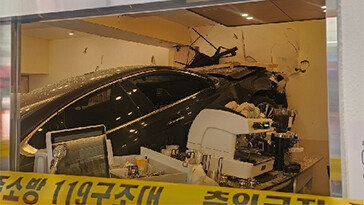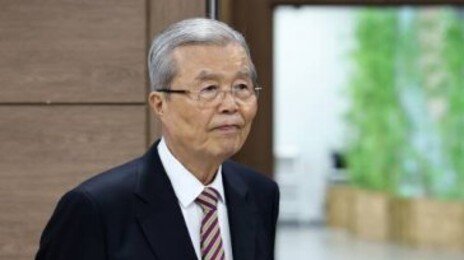한국은 있다 - 휴전 50주년에 부쳐
이 문 열
오늘로 1953년 7월 27일에 이루어진 한국전쟁의 휴전은 50주년을 맞는다. 그 휴전 이후 한반도(韓半島) 분단은 고착(固着)되고, 남한과 북한은 각기 치열한 경쟁관계에 들어간 두 이데올로기의 전시장(쇼 윈도우)으로 기능하기 시작한다.
태평양전쟁이 끝나던 해 미국과 소련은 북위 38도선을 경계로 한반도를 나누고 남북에 각기 다른 체제와 이데올로기를 강요했다. 소련군이 점령한 북한은 공산주의에 혁명세력을 자처하는 집단에게 장악되었고, 미군정이 시작된 남한에서는 자본주의에 바탕한 보수세력의 정권이 예정되었다.
하지만 그 뒤의 진행은 남과 북이 사뭇 달랐다. 한쪽은 눈치 빠르고 영악한 후견인(後見人)을 둔 덕분에 잽싸고도 일사불란하게 자기들에게 예정된 몫을 챙겼다. 그러나 다른 한 쪽은 물정에 어둡고 갈팡질팡하는 후견인 탓에 제대로 제 몫을 챙길 수 없었다.
1945년 일본군 무장해제를 구실로 북한에 진주한 소련군은 그 땅을 군정(軍政) 없이 바로 김일성 집단에게 넘기고 철수했다. 그 결과 김일성 일파는 그 동안 과장해온 민족주의적 이력(履歷)에 별로 상처받지 않고 권력을 장악할 수 있었다. 뿐만 아니라 1946년까지는 이(里)동(洞) 단위까지 인민위원회 설치를 완료함으로써 사실상 공산주의 정권을 북한에 수립했다.
이와 같이 신속한 일당(一黨)독재체제의 구축은 뒷날 보게 되듯 김일성 우상화의 좋은 바탕이 되었다. 일본 제국주의가 조선왕조의 왕좌에서 이(李)왕가를 끌어내고 일왕(日王)을 앉혔듯이, 김일성은 소련군이 고스란히 물려주고 간 일왕의 빈자리를 재빨리 차지할 수 있었기 때문이다.
그런 북한에 비해 남한의 제몫 찾기는 어수선하면서도 지지부진했다. 미군은 해방자의 이름으로 왔지만 군정청(軍政廳)의 의식은 미국-스페인 전쟁에서 이겨 필리핀을 차지했을 때와 크게 달라진 것 같지 않았다. 일본에 이겨 그 식민지를 접수한다는 태도로 한반도에 상륙했고, 친일부역자(親日附逆者)들을 중간 관리로 기용해 3년이나 군정을 실시한 뒤에야 남한에서의 정부수립을 인정했다.
하지만 그 사이 남한 국민들의 의식에 적어도 두 가지 큰 변화가 있었다. 하나는 절대군주적인 권위의 토대가 철저히 부수어진 것이고, 다른 하나는 정치적 자유에 대한 기대가 지나치게 부풀어 오른 것이었다. 그 때문에 분단 될 때 남한에 예정되었던 자본주의와 보수(保守)우파(右派)의 몫은 무시되고, 사회 여러 가치의 새로운 배분(配分)이 주장되었다.
정부수립부터 한국전쟁이 터질 때까지의 2년 동안 신생(新生) 남한정권이 제몫을 되찾기 위해 벌여야 했던 힘겨운 싸움은 이제 와서 돌아보면 애처로운 데마저 있다. 한반도의 절반이면서도 남한은 온전한 정치단위로 간주되고, 북한과는 달리 모든 정치세력을 민주주의와 다양성의 수용이란 구실아래 허용해야했다. 사상 집회 결사의 자유란 구호 아래 남한 사회는 갈가리 찢어졌으며, 정치 과잉으로 체제의 생산성은 형편없이 저하되었다.
그러다가 남북의 배분이 처음 예정대로 실현된 것은 유감스럽게도 한국전쟁 3년간을 통해서였다. 내전(內戰)의 엄혹함은 남북 양쪽 모두에게 철저한 자기점검(點檢)과 내부숙청(肅淸)을 요구했다. 그리하여 휴전이 이루어졌을 때는 북쪽에서 자본주의 보수 우파가 사라진 것처럼 남쪽에서도 공산주의뿐만 아니라 혁신이나 진보의 논의까지 자취를 감추었다.
그런데 그 휴전으로부터 반세기가 지난 지금 한반도의 사정은 많이 달라졌다. 북한은 흔들림 없이 세습독재(世襲獨裁)를 제몫으로 지켜내고 있지만 남한은 다시 제몫을 잃어가고 있다. 좀 과장하면 50여년 전, 우리가 흔히 '해방공간 '이라고 말하는 혼란의 시기로 돌아가고 있는 느낌이다.
근년 들어 적잖은 지식인들이 거리낌 없이 좌파를 자처하며 남한 체제 안에 그들의 자리를 내어놓으라고 요구하고 있다. 이에 비해 남한의 우파들은 전에 없이 깊은 우려와 경계의 눈길로 그들을 주시한다. 남한의 좌파 일부가 북한과의 연계를 통일염원(統一念願)으로 위장하는 만큼이나 우파 일부의 위기감이 슬슬 광기를 띄어 가는 것도 걱정해야할 대목이다.
진보와 보수의 논쟁도 위험한 수위에 이른 느낌이다. 진보를 독점한 좌파들은 우파를 보수로 몰뿐만 아니라 보수는 곧 악(惡)이라는 대중적 이미지 조작에 성공한 성싶다. 한국의 많은 지식인들은 우파와 보수와 악을 성공적으로 등식화(等式化)한 선동세력에 전율과 아울러 불길한 의혹을 느낀다.
하지만 더 별난 일은 많은 한국인들에게조차 난데없고 어리둥절하게 느껴지는 반미감정의 대중화이다. 이전에도 구호로서의 반미(反美)는 심심찮게 들어왔지만 그것은 어디까지나 소수의 예외적 목소리였다. 그런데 최근의 반미집회는 쉽게 무시할 수 없는 머릿수의 대중을 배경으로 유지되고 있다.
왜 이렇게 되었을까. 무엇이 남한 젊은이들에게 <혈맹우방(血盟友邦=피로 맺어진 친구나라)>이란 말을 <반공(反共)>이란 말만큼이나 희극적으로 들리게 하고, 대수롭지 않은 불만으로도 '주한미군 철수'를 외치며 서슴없이 성조기(星條旗)를 불태우게 할까.
미국의 한반도 정책의 문제점은 지금까지 많은 사람들에 의해 논의되어 왔고, 바로 이 부분도 여러 각도에서 분석되어 답을 얻어냈을 것이다. 하지만 그래도 감히 보탤 게 있다면 그것은 대한제국(大韓帝國) 시절부터 별로 변하지 않은 듯한 미국의 관점(한국을 보는)이다. J . K . Fairbank가 오래전에 쓴 <동양문화사(東洋文化史)> 서문에 이런 구절이 있었다.
"미국은 태평양전쟁에서 중국을 위해 일본과 싸웠고, 한국전쟁에서는 일본을 위해 중국과 싸웠다."
그때는 얼른 이해할 수 없는 구절이었으나 갈수록 한국을 보는 미국인의 관점을 잘 드러내는 말로 보인다. 곧 자기 젊은이들이 한국 땅에서 피 흘리며 싸우는데도 미국의 의식에는 한국이 없었다. 미국에게 한국은 언제나 중국의 일부거나 일본의 일부로 이해되고 있었을 뿐이었다.
50년 전 휴전 때도 그랬다. 한국전쟁은 3백 50만이 넘는 인명피해로 한국인 열명 중에 한명 이상이 죽거나 다쳤고, 세 명 중에 하나가 가족이 남북으로 헤어져 살게 되는 슬픔과 고통을 맛보아야 했다. 하지만 휴전협정을 조인하는 자리에는 중국과 그 동맹국 북한은 있어도 별도의 한국은 없었다. 남측 대표는 유엔군 사령관을 맡고 있는 미군 장성(將星)이었고, 남한 대표는 참석하지 못했다.
그 뒤 50년이 지난 지금도 크게 달라진 것은 없는 듯하다. 얼마 전 북한의 핵문제를 논의한 베이징 회담에서도 한국, 특히 남한은 없었다. 중국과 북한, 그리고 미국이 모여 한반도 비핵화(非核化)를 논의 했는데, 북한이 중국의 일부라도 되는 것처럼 중국의 역할에 기대를 걸고 있었다.
한국 사람들을 가장 효과적으로 약 올리는 방법은 바로 한국을 중국의 일부로 보거나 일본의 일부로 보는 것이다. 따라서 그런 관점에서 수립된 미국의 한반도정책이라면 한국에서 좋은 결과를 기대하기 어렵다. 늦었지만 이제부터라도 미국은 한국, 특히 남한의 자리를 만들어야 한다. 동북아시아에는 중국 일본과 더불어 한국도 있다. 한국이 따로 있다.
The Country America Cannot See
By MUN YOL YI
South Korea
Today is the 50th anniversary of the cease-fire that ended the Korean War. The division of the peninsula by two "liberation" armies ?both of which seemed to hold it in no special favor ?was an unwelcome gift thrust upon the Korean people, still dazed by the emotions of liberation from Japan in 1945. The intense nuclear anxieties on the Korean Peninsula now demonstrate the lingering effects of this gift.
The regimes imposed by the Soviet Union and the United States on North and South Korea at the end of the Second World War evolved quite differently ?and not necessarily in the way Americans assume they did.
One side, thanks to a shrewd, quick-witted guardian, got what it was promised (the North). But the other side, owing to the obtuseness and confusion of its imperial benefactor, failed to develop into the strong democracy it was expected to become.
The Soviets, who had been thwarted by nationalistic sentiments while trying to export the socialist revolution to Eastern Europe i
n the 1920's, immediately handed North Korea over to the group led by Kim Il Sung and withdrew, leaving no military administration behind. As a result, Kim seized power without serious damage being done to his nationalistic credentials. What's more, the rapid creation of a system of one-party rule formed a good basis for the idolization of Kim Il Sung. For just as the Japanese had replaced Korea's Yi dynasty with their emperor in 1910, Kim Il Sung took the throne left empty by the Japanese emperor, who had been banished by the Soviet troops.
In comparison with what happened in the North, South Korea's search for its proper role was chaotic and drawn out. The American forces arrived as liberators ?yet the military government they established in 1945 resembled the heavy-handed one the United States imposed on the Philippines after the Spanish-American War in 1898.
Without regard for the nationalistic feelings among Koreans, the military administration put people who had collaborated with the Japanese in official positions. Only after three years of questionable military rule did the United States approve the establishment of an independent government in South Korea.
Those three years ?from 1945 to 1948 ?did lasting damage (in the name of democracy), bringing about at least two changes in the consciousness of South Koreans.
First, the idea of a monarchy was completely demolished. While the other East Asian kingdoms saw a restoration of their monarchies after the Second World War, in South Korea the topic was never properly debated. Had a new monarchy been created ?or had it even been discussed fully ?South Koreans would have had an outlet for their nationalistic sentiments.
Second, there was among South Koreans an unrealistic level of belief in and hope for freedom of expression and thought. (Except, of course, when it came to discussing a monarchy.) As opposed to the North, the government in the South was obliged to permit every kind of political party in the name of democratic pluralism.
These two factors set the stage for the Korean War. In South Korea, the lack of a strong leader and the excessive openness of society enabled the country's Communists to grow stronger and stronger. The chaos they created, the acts of terrorism they committed, made civil war inevitable.
And here we are, half a century later. What has changed? What has stayed the same? North Korea still maintains its hereditary system of rule without any dissent. It continues along its appointed path. South Korea, on the other hand, is struggling to find itself. I have the feeling, if I may exaggerate only slightly, that we are returning to the anxieties we felt before the Korean War.
These anxieties are particularly evident in the vicious battles between left and right in South Korea over reunification and political and economic reform. With greater and greater frequency, demagogues on both sides identify their opponents as evil.
These anxieties are apparent, too, in the widespread and intense anti-American feeling among Koreans. Anti-Americanism has always been around, but until recently it has usually been embraced by a minority only. When we see the lack of outrage among South Korean students at the fatal shooting of five of their number by the North Korean Navy ?a contrast to the repeated calls for justice for the two girls killed by American soldiers driving a tank ?we must assume there are changes in thinking among these students that go beyond simple nationalistic feelings.
We may never understand why America committed troops to the Korean Peninsula in September 1945. And we may never know, truly, why those troops have stayed here since. But I think we can say with some certainty that America never expected to find itself in its present situation in South Korea, and in particular to be treated as an enemy.
The problem of American policy toward Korea has been endlessly debated and analyzed. Still, if there is anything to add it is this: the American perspective on Korea has changed little since the end of the 19th century. As John King Fairbank, the historian, made clear in "East Asia: Tradition and Transformation," in the Pacific War America fought Japan for China; in the Korean War, it fought China for Japan.
When I first read these words roughly 20 years ago I failed to catch their full significance, but over time this sentence revealed to me the American perspective on Korea. Namely, even though America's young people fought and shed blood on Korean soil, Korea was not a part of the American consciousness. For America, Korea has always been understood as a part of China or a part of Japan.
It was the same when it came to the armistice. There were more than 3.5 million victims of the Korean War. One in 10 Koreans was killed or wounded; one in three was forced to experience the agony of living separated from family, in North or South. Yet when the armistice was signed, although China was there with its North Korean ally (having replaced the Russians), there was no place for Korea. The South Korean representative was the American general acting as commander in chief of the United Nations forces; no South Korean representative was present.
It seems that still now, 50 years later, nothing much has changed. At the recent Beijing talks on the North Korean nuclear crisis, Korea, especially South Korea, was absent. China met North Korea, and America, to discuss nuclear disarmament on the Korean peninsula, but I wonder if even there America, while recognizing the existence of North Korea, did not consider it to be part of China.
There is no more effective way for foreigners to provoke Koreans than to view Korea as part of China or part of Japan. Naturally, from this standpoint it's difficult for Americans to expect a positive response from Korea. Although it is late in the game, America must make space for Korea, and especially South Korea, in its consciousness. In East Asia there is in addition to China and Japan, Korea. A Korea distinct and separate.
Mun Yol Yi is author of Our Twisted Hero,a novel. This article was translated by Bruce Fulton, Ju-Chan Fulton and Brother Anthony from the Korean.
-
- 좋아요
- 0개
-
- 슬퍼요
- 0개
-
- 화나요
- 0개
-
- 추천해요
- 개
지금 뜨는 뉴스
-

커피 마시다 참변…‘車 돌진’ 카페 손님, 6일 만에 숨져
- 좋아요 개
- 코멘트 개
-

김종인 “대통령실 오찬 거절한 한동훈, 희망 가지려면 尹과 멀어져야”
- 좋아요 개
- 코멘트 개
-

“뛰고 온 사람에게 뜨거운 물”…부산마라톤 참가자 항의 폭주
- 좋아요 개
- 코멘트 개
댓글 0